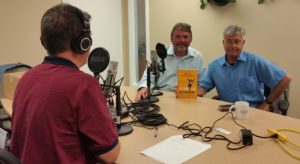
As of Saturday morning, you can find a half-hour podcast conducted by Debt-free in 30’s Doug Hoyes about the new book, Victory Lap Retirement.
My co-author, Mike Drak, and I were in Waterloo last week to tape the session and sign a few books.
Click on the highlighted text here to listen to Victory Lap Retirement. EXCLUSIVE First Podcast Interview.
Or you can scroll down below for a lightly edited transcript of the proceedings.
But first, here’s an overview written by Doug Hoyes, co-founder of insolvency trustees Hoyes Michalos:
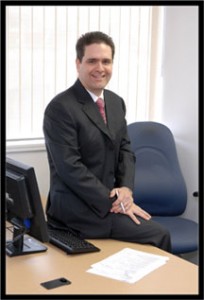
Doug Hoyes:
Today’s podcast is the first ever podcast interview with Jonathan Chevreau and Mike Drak together, talking about their new book Victory Lap Retirement. This is so exclusive an interview that the book won’t even be officially released until October 10, 2016 but it is available for pre-order at amazon.ca, and the Kindle version is available now.
Jonathan was a guest back on Show #5 where we discussed his previous book, Findependence Day.
Mike Drak created the concept of a Victory Lap as an alternative to retirement, and teamed up with Jonathan to write their new book.
So what is a Victory Lap?
You will have to read the book for a full description, but as Jonathan and Mike and I discussed the concept of retirement has changed significantly. Our grandparents and parents had a good chance of working at the same company until aged 65, and then retiring with a full pension before dying at age 70.
Today almost no-one works at the same company for their entire working life, and most employers no longer offer full pensions, so the old fashioned view of retirement at age 65 with a full pension is no longer reality for most workers.
Instead, we are working longer, and living longer.
The essence of Victory Lap Retirement is to leave corporate employment, which usually entails working for someone else, and enter a new and different phase of your life.
Mike and Jonathan wrote Victory Lap Retirement to show readers how to transition from a high stress work environment to a low stress sustainable lifestyle to enjoy a happier, healthier life. For many, that may involve turning a hobby or passion into income during your “retirement” years, or working part time to “stay involved.”
Debt and Retirement
Debt is a prominent subject in Victory Lap Retirement, including this quote:
…make breaking free from the chains of debt your first priority. Not only will debt limit your financial freedom severely, it will suck the life right out of you.
As we discussed, debt and retirement don’t mix. When you retire your income decreases, so it’s likely you won’t be able to afford payments on a mortgage or other debt in retirement. Get out of debt long before retirement.
Unfortunately that’s not always possible, which is why seniors are the fastest growing age group of people filing bankruptcy and consumer proposals. Older debtors, aged 50 and older, now account for 30% of all insolvency filings, up from 27% two years ago, and that number keeps growing.
Senior debtors, people aged 60 and over, have the highest amount of unsecured debt of any age group when they go bankrupt, almost $70,000. A growing percentage of them even resort to payday loans to stay afloat.
If you’ve got debt, retirement is very difficult. If you have trouble making your debt payments while you are working, it may be impossible to keep up when you retire and your income drops, which is why we all agree that eliminating debt is essential long before retirement.
In addition to eliminating debt, Mike and Jonathan suggest you ask yourself “what do I like to do?” and start planning your Victory Lap now.
For more, listen to the podcast or read the transcript.
Transcript:
Doug Hoyes:
Today we’re going to talk about retirement. No, I’m not going to talk about how much you need to save for retirement; I’m not a retirement expert so you don’t want me doing that math for you. I’m a debt expert and I happen to know that the fastest growing group of people who go bankrupt are seniors and people who are approaching retirement age. Older debtors, aged 50 and older now account for 30% of all insolvency filings, up from 27% two years ago and that number keeps growing.
Senior debtors, people aged 60 and older, have the highest amount of any age group when they go bankrupt: almost $70,000. A growing percentage of them even resort to payday loans to stay afloat. If you’ve got debt, retirement is very difficult. If you have trouble making your debt payments while you’re working, it may be impossible to keep up when you retire and your income drops.
Today my guests are two gentlemen who have just published a book and this is I believe one of the first podcast interviews they’ve done to talk about it. I’ve read the book and I’m probably misinterpreting their main message here but what I got out of it is that the concept of retirement is dead.
Why? Well, for starters it’s not like the good old days where you work for the same company for 40 years and retired with a full pension. It’s hard to find anyone who has worked at the same company for more than five years, let alone 45, and most employers no longer offer company pensions.
That’s not the only reason the concept of retirement is dead, but you don’t want to hear my opinions on it so let’s hear from my guests. Guest number one, you’re a returning guest so let’s get started, who are you and what do you do?

Jonathan Chevreau:
Thanks Doug, I’m Jonathan Chevreau. Last time I was here, we were talking about my financial novel Independence Day. This new book Victory Lap Retirement is the sequel and has been written with Mike Drak, who we’re going to talk to shortly. In the preface of the book Mike wisely calls it a retirement book about not retiring. The subtitle of the book is Work While You Play, Play While You Work.
Our message is first of all that we’re going to live a long time, maybe even to 100, so if you’re a senior in debt there’s really only one solution. You’ve got to keep working, at least part-time. But work can be fun: you can work while you play and play while you work. So, why don’t we pass it over to Mike to talk about that?
Doug Hoyes:
If Findependence Day was the prequel to this book and that’s in fact what you say in this book, let’s hear your perspective Mike.
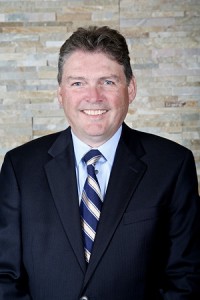
Mike Drak:
I guess I’m a rare bird because I did work with the same employer for 36 years and now I’m happily involved in planning and executing my own Victory Lap. It’s something that came up once I was considering leaving my original job. I really didn’t know what to do at that point because I knew I needed a change, knew I needed to leave where I was working for 36 years. But I didn’t know if retirement was the right thing for me.
So I did a lot of research and read every retirement book I could get my hands on and finally figured out no, retirement isn’t the answer. For me I wanted something different and I came up with the idea of why not continue working? But instead of working at a job just to make money, I wanted to find a job that I could love, that I could work for as long as I wanted and money was a by-product. But it was interesting, it was fulfilling and it gave me a good reason to get up out of bed in the morning. So I worked with Jonathan on this book and we put our heads together and we think we came up with a good long-term solution for a lot of people out there.
Doug H: The name of the book is Victory Lap Retirement. At the start of the show I said retirement is dead and nobody works at a company for a long time. Well, of course you just disproved that and I think Jonathan you had a long time with a limited number of employers as well.
But I don’t think I’m wrong and I think the gist of your book kind of talks about this as well. I said retirement is dead because we don’t work for the same employers forever but there are other reasons why it is potentially dead or changing as well. So, Mike what are some of the reasons that retirement today is completely different than what we would have thought even 10 or 15 years ago?
Mike D: I believe the word retirement is misused a lot today. It did make sense at one point if you go back maybe 50 years or so when they first came up with the concept of retirement. A lot of people would retire at the age of 65 but longevity at that time was short and they were lucky to spend one or two years in the old rocking chair. Most people back then did physical jobs and really when they retired they weren’t very active, they just kind of sat back and rested. So, you had a very short period of retirement, which kind of made sense.
But now you can end up spending more time in retirement than you did in your working life. So, you have say 30-plus years that you have to find something to fill those years. So my definition of retirement is I would push it back until that period where you want to withdraw: retirement does mean withdraw or pulling back. So, you reach a point where physically you don’t want to do certain things or maybe it’s at a point where you want to leave your house and move into a retirement home. To me that means retirement.
The question is what do you do with that big gap between when you leave your primary career and reach retirement in say 20 or 30 years. You need something to fill that gap and that’s where we came up with the term Victory Lap Retirement. To us the Victory Lap means we worked for a long time in our primary careers, and achieved financial independence or Findependence, which we call the cornerstone of Victory Lap Retirement. And then it’s a time of celebration because we’ve met most of our financial responsibilities, took care of our families, got them out of the house hopefully at some point. And now it’s our time to celebrate and so something interesting for us and fill those next 20 years and develop a high quality of life.
Doug H: That makes sense. Jonathan, in chapter 3 you talk about the six stages of the financial life cycle. Stage one is debt and frugality so give me the overview of what that means.
Jonathan C: The human financial life cycle closely tracks the whole human lifecycle. But with the financial lifecycle, we basically start life as financial infants at age 18. The whole name of the game of retirement saving is that over 30 or 40 or 50 years you convert your human capital — your future earning potential — into financial capital for the day when you can no longer physically work or you can no longer find employers or clients.
Most of us start out as students and are in debt. You have student loans and you have credit-card debt. People say you should have a TFSA, but there’s no point earning 1.5% in a GIC if on the other side you’re owing 20% on your credit cards. So the first stage is to get out of debt. As the Didi character says in Findependence Day, you can’t climb the tower of wealth until you dig yourself out of the basement of debt.
Doug H: And I believe she also said freedom not stuff.
Jonathan C: Same thing. That should be tattooed on our forehands. Every time you’re going to make a purchase you should stop yourself and say do I want this stuff that’s going to accumulate dust and rack up my credit card more or do I really want freedom? Freedom and Victory Lap Retirement are the same thing. We all want financial freedom but you don’t need it in retirement when you’re 75 years old, you want it ideally much earlier: findependence in your 30s.
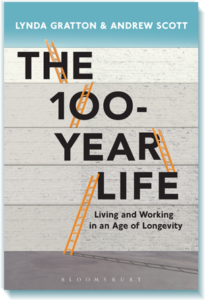 There’s a book that I highly recommend, The 100 Year Life, I’m reading right now about longevity and the millennials. A lot of them are going to be reaching 100 and their working life spans are going to be 80 years.
There’s a book that I highly recommend, The 100 Year Life, I’m reading right now about longevity and the millennials. A lot of them are going to be reaching 100 and their working life spans are going to be 80 years.
If you remember the classic book The Three Boxes of Life, it described spending the first 18 years of your life being educated, then the next 40 years doing what you, Mike and I did: 20, 30, or 40 years “slaving and saving,” then you got to stop and do nothing for five or 10 years.
As you’ve pointed out, Tim Ferris — author of The 4-Hour Workweek — talks about mini retirements and multiple careers: we’re going to go in and out of learn, work, play, learn, work, play and so on. The key to be able to make those transitions even when you’re in your 60s and 70s is financial independence.
Doug H: And the foundation then is not having any debt. I keep harping on that because this show is called Debt Free in 30. So your book goes into many different areas, I’m just picking on the one specific one that I think would be of most interest to my listeners here. Let me read another quote from the book: “Make breaking free from the change of debt be your first priority. Not only will debt limit your financial freedom severely but it will suck the life right out of you.” What are you guys getting at with that phraseology?
Jonathan C: I can speak from my own experience. For many years when I was working in the corporate world, I had a fear of debt. You live in fear because you have to make the mortgage payments, you’ve got to make sure the kids go to school and you help pay for their education and all these things. So, you’re always living in fear of losing your job, of not being able to make those payments and not being there for your family.
You don’t want to live in fear because it’s not good for you, it causes a lot of stress. So, the sooner you can get away from that burden of fear the better off you’ll be. Being free of debt just opens up a world of options for you. That’s why we coach everyone and we say as soon as you start working you should start working towards financial independence right away and gain back your freedom. That gives you the flexibility to do different things and takes the pressure off, opening everything up for you.
But you have to start right, you have to have the right habits to make sure that you live a frugal lifestyle and don’t get carried away, you don’t buy the latest sports car or you don’t buy a bigger house than what you need. These are all important things and today unfortunately I don’t think we’re teaching our kids well. I don’t know why but it seems that people are coming out of school and going into the workforce unprepared. They have to know these are important goals and think about these goals before they go out and buy something that they really don’t need.
Mike D: Freedom, not stuff.
Doug H: Yeah and we could do a whole series of podcasts on that topic, but what I find interesting about what you both said is you haven’t been quoting me numbers. You did mention that 1.5% interest in a TFSA, which is a pretty good return if it’s a savings type vehicle. What you’ve been talking about is much more about karma, stress, worries about money and debt. There’s another phrase in the book where you say money is a form of stored life energy. What are we talking about there?
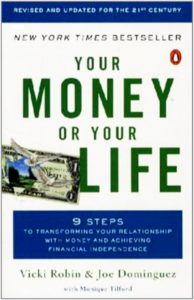 Jonathan C: That’s from a classic book called Your Money or Your Life, which a lot of financial planners are familiar with. They have financial independence in the sub title of that book and they basically talk about thinking of money as stored life energy. To earn money you have to exert life energy, so somebody pays you $100. Now before you spend it, you have $100 of your life energy. Now we have very finite lives, 22,000 days, 22,000 nights said the Moody Blues, perhaps it’s a little bit more these days.
Jonathan C: That’s from a classic book called Your Money or Your Life, which a lot of financial planners are familiar with. They have financial independence in the sub title of that book and they basically talk about thinking of money as stored life energy. To earn money you have to exert life energy, so somebody pays you $100. Now before you spend it, you have $100 of your life energy. Now we have very finite lives, 22,000 days, 22,000 nights said the Moody Blues, perhaps it’s a little bit more these days.
Doug H: I’m doing the math to see how many I have left but okay continue, 22,000.
Jonathan C: So every time you spend money you’re also expending your life energy. You can never retrieve that. Money is potentially infinite but your time to earn it is not. The whole point of financial independence and freedom that Mike was just talking about is that you should try not to waste or squander this stored life energy.
Now one of the corollaries apart from debt, and if you’re no longer in fulltime employment, is the concept of multiple streams of income. If you were fortunate enough to spend 20 or 30 years in a corporate pension plan, that may be a nice stream of income in retirement. So is the CCP, so is OAS. But those streams don’t preclude you from also working, continuing to employ that life energy to create even more financial energy, which is what money is. We say the foundation of financial independence is a paid-for home. I still believe it, you shouldn’t even think of going into retirement if you have mortgage debt and certainly not if you have consumer debt.
Doug H: I absolutely agree. Seniors are the ones we are seeing more and more than we did in the past. They’ve got more debt than what they’ve ever had before. One of the reasons is that’s how our society is built. Nobody buys a car for cash anymore, you always get a car loan to buy a car. Nobody buys a house for cash anymore, you get a mortgage for 95% of the value because that’s the way it’s supposed to work. And obviously that comes back to bite you. So, getting out of debt is the foundation: you have to do that first. If you’ve got debt you’re totally pooched.
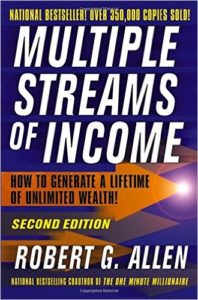 Now Mike, maybe you can elaborate about what Jonathan said about Multiple Streams of Income. In the old days, we worked till we were 65 and died at 70. so there was only five years of retirement anyways: you got your pension cheque from your company, maybe there was some small government money, that was it. But now the average person who has reached 65 has a pretty good chance of living to be 90, am I right?
Now Mike, maybe you can elaborate about what Jonathan said about Multiple Streams of Income. In the old days, we worked till we were 65 and died at 70. so there was only five years of retirement anyways: you got your pension cheque from your company, maybe there was some small government money, that was it. But now the average person who has reached 65 has a pretty good chance of living to be 90, am I right?
But maybe I don’t have a company pension because a lot of people don’t and if I do maybe it’s not as much as it used to be. What are some other streams of income that can help mitigate the fact I’m going to be living for a long time? Obviously my medical expenses are going to increase as I get older. What are some other things I should be thinking about not when I’m 65 but earlier to set myself up for that next stage of life?
Mike D: What we’re looking at is creating new sources of income, active income from employment that can supplement your pensions, CPP, OAS and other income streams. Some of the things we recommend to some people is maybe monetize a hobby. When you’re at work and have a hobby, maybe you like to do renovations or design products or build Muskoka chairs. Actually think about, okay when I leave my primary career and I want to slow down the pace and I want to create new work that I find satisfying: your hobby could be a natural extension of what you like to do. Then make additional income from that source.
Or maybe branch into multiple activities that you like to do and make money from those sources. You could even work part-time for a company, then monetize your hobby on the side and make money from those two sources. And you control them because you determine how much time you want to spend doing those activities and making money and also to make sure you have sufficient leisure time to do these other things that you enjoy. So, it’s a complete rebalancing. You have additional income coming in, which gives you an additional safety net, plus you’re doing things that you enjoy and you have a fulfilling life.
Doug H: It’s interesting when you say that because what you’re talking about is prepping for retirement by perhaps monetizing your hobbies. For example I like to do carpentry work so why don’t I build stuff for people? If I asked that question of a millennial, they would call what you just described as a side hustle. So, I’ve got my main job working for the man five days a week but on the weekends I’m a bouncer or a bartender at the bar or I sell things on Kijiji or I teach yoga in the park or whatever. It’s really the same concept. It’s finding more than one way to bring in money.
And as I think about that, boy that’s a pretty good way to get out of debt too. Rather than just having your main source of income as you get older hopefully that income is going to be set aside for your retirement, but in the short term it can be used to pay off debt as well. So there’s really no reason not to do it other than time.
But you also said it should be something you enjoy, how important is that in this process? ‘Cause you’re not saying work 80 hours a week and make as much money as you want or can, you’re really saying the opposite, you’re saying balance is really much more important. Am I right?
Mike D: That’s right. When we talk about balance, we’re trying to say we’re no longer focused solely on the pursuit of money. What we want to do is pursue fun and do things that are interesting and try new experiences but at the same time trying to derive some money from the activities. Many people love going to yard sales on the weekend and will buy products and sell them on eBay and things like that. But they enjoy it and they make money at the same time.
Doug H: So it becomes a way to make money as well as having fun. So, Jonathan, elaborate on that for us.
Jonathan C: I have a good example because each summer we spend some time at a friend’s cottage in Peterborough, which is retirement country. There’s a festival of artists there. What we found as we talked to the people and bought some of the art, there’s a lot of retired teachers who have these wonderful pensions: my father had one so I know. And yet they were still working. Their Victory Lap was they’d always on weekends just done paintings of seascapes and things like that. And now they were joining these three day-art festivals, had little booths, they invested a little bit of time and energy and maybe had a couple of students manning it for them. And they were selling these paintings for like $500 or $1,000, or pottery or crafts. That’s a perfect example.
Similarly music: my brother is mentioned in Victory Lap, he just turned 60 and his bucket list included starting a rock group. He’s in Waterloo and used Kijiji to form a band called Good Company: you can find them on Facebook. At first it was just supposed to be on his bucket list but he said he wanted multiple streams of income and wanted music to be one of those streams.
In the the book somebody in the investment industry — whose sister in law was a life coach — decided he wanted to be an actor, just last week we saw him in a short film called Go Fish. It was so exciting to see this former guy who was in the same line of work as Mike in his former career. There he was on the big screen, on the film for about three or four minutes, not a lot, but it was a paid gig. So, absolutely, you can turn a hobby into a money maker. Even in Findependence Day there’s a subplot when Jamie the protagonist turns his passion for vinyl records into a whole little business, or side hustle as Millennials put it.
Doug H: So there are many different ways to do it.
Mike D: Yes. Just following Jonathan’s lead, I know in the book he mentioned one of his neighbours. I believe is she 100 years old?
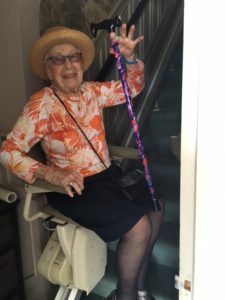
Jonathan C: Yes, my friend Meta turns 100 in November.
Mike D: She works part-time to fund her visits to Niagara on the Lake in the wineries. That’s what she uses to fund this hobby of hers, which is interesting. But when you talk about people who wanted to be artists all their lives but they couldn’t do it because they had to meet the responsibilities for their families so they got corporate jobs as an example. And they worked hard for 35 years, then later after they retired by the old definition, then finally had the opportunity to go and pursue this passion, which is art. The interesting thing about artists is they don’t retire. They work until they die because they love doing it. I find that very interesting and that kind of throws my thinking about retirement out the window because why would you ever retire if you’re doing something you love?
Then I look at self employed people who work longer than salaried people in the corporate world because again they love what they’re doing. They might pull back a bit, they might change up the mix and take some of the pressure off but they stay involved for as long as they want.
I just came back from a fishing trip with a group of people. The oldest one on the trip is 82 and is a dermatologist in Little Rock Arkansas. He’s still working four days a week. The next oldest was 79, he semi-retired, sold his business to his son, but still works three days a week. Everyone there was over the age of 66 and they’re all still working, so it kind of changed my way of thinking on the subject.
Doug H: It sounds to me like they’re not really working, they’re doing what they like but it meets the definition of work because someone’s paying them to do it.
Jonathan C: A classic example would be the Beatles. When John Lennon was interviewed right at the beginning he was asked why are you doing this? He said they saw Elvis Presley on TV and they said that looks like a good way to make a living: it sure beats having a job plus you can pull birds: he was referring to attracting the opposite sex. They loved doing the music and didn’t worry about the odds of becoming The Beatles, they were The Beatles and they of course made so much more money than if they had joined the local accountancy firm or banking, insurance, journalism, or all those other supposedly secure careers.
There’s a lot more security actually in self employment as we talk about in the book because what can be more insecure than having all your eggs in one basket? A traditional job where if you fall afoul of your boss, you’re out of there: your single stream of income just became no income. When you’re self employed you have multiple streams of income. It’s sad if you lose a client here or there but you just replace it gradually, again the concept of multiple streams of income.
Doug H: It’s obviously something people have to think through because there are risks to being self employed. Technically I’m the co-founder of Hoyes and Michalos & Associates, so it’s Hoyes & Michalos, the two of us so we are technically self employed and you’re right, the reason we’re self employed is we weren’t great working for others, didn’t like authority all that much, wouldn’t have survived all that long while we lasted as long as we could in the big accounting firms but it wasn’t our thing. There’s more risk to that but there is also obviously a lot more reward and a lot more control potentially over your life. But as you said Mike, self employed people tend to work a lot more than people in traditional industry anyways, that’s just the way it is.
So let’s bring this to a logical conclusion and tie up all the loose ends. The starting point, if I may put words in your mouth, is that if you’re moving into retirement or frankly if you’re moving into the age of 30, you want to have as little debt or no debt as possible. Because all these wonderful pictures you painted for us about artists painting by the river in Peterborough well, if you have a boat load of debt, that’s not happening. You’re working multiple jobs because you have to. So, that has to be the starting point.
Then I think the second concept again is that retirement isn’t something that starts at age 65. These multiple streams of income, the things that you like to do can start tomorrow and that’s always my advice. I meet with lots of people who have gone through a layoff at work and they’re having trouble and I say what do you want to do when you grow up? I don’t care if they’re 40 or 50 years old when I ask them this question. They say well, I’d like to do X and I say, great start doing it now. Love working with animals? Okay, go volunteer at The Humane Society today. You can start your Victory Lap immediately even if you still have the traditional job. Am I right or wrong on that?
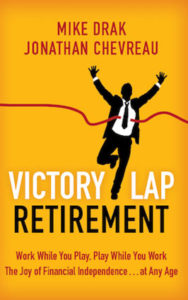 Mike D: You can start setting yourself up for a Victory Lap and that’s what we counsel in the book. Prior to jumping off, at least five years prior, you should start putting a plan together for your exit from the corporate world and figure out exactly what you want to do, what your strengths are, where your interest are, where your passions lie. It’s almost like you’re deconstructing your corporate life. You’re looking at the blocks, then starting to rearrange them. Maybe you’ll throw out some ones you don’t like and add some new ones. And find a new way of life in Victory Lap for yourself. You want to create an exciting, fulfilling life, one that you want to wake up to every day and you enjoy: this new combination of work and play is very satisfying.
Mike D: You can start setting yourself up for a Victory Lap and that’s what we counsel in the book. Prior to jumping off, at least five years prior, you should start putting a plan together for your exit from the corporate world and figure out exactly what you want to do, what your strengths are, where your interest are, where your passions lie. It’s almost like you’re deconstructing your corporate life. You’re looking at the blocks, then starting to rearrange them. Maybe you’ll throw out some ones you don’t like and add some new ones. And find a new way of life in Victory Lap for yourself. You want to create an exciting, fulfilling life, one that you want to wake up to every day and you enjoy: this new combination of work and play is very satisfying.
Doug H: Let me ask you that same question Jonathan. How do you advise someone to set themselves up for their Victory Lap?
Jonathan C: As Mike says it’s certainly good to have a plan and incidentally you probably shouldn’t let your boss know about it. On the other hand we also have a section on Sudden Retirement Syndrome, which impacts a lot of people in this economy. You may have no warning so may not have three years to plan it: if you get a pink slip you might have two hours to clear out the office. It’s happened to most of us, particularly entrepreneurs.
This is why we emphasize getting out of debt and having financial independence. Even if you have a secure job, you may have another five years to implement the plan, or you may have only two weeks and a severance package that will last you six months. But it’s a lot easier to live on a severance package and maybe some of our multiple income streams, maybe take your pension early, CPP or whatever if you have no debt. Again, debt is just this horrible boat anchor so it’s pretty clear I’m opposed to it.
So the key to a Victory Lap again is Findependence, not just at 65, it’s not the same as retirement, you should strive to be mortgage free in your 30s to be findependent in your 30s. Then if the worst happens, you’ve got a safety net to take you to the next level.
Doug H: Makes perfect sense. So, for you Jonathan, what does a Victory Lap look like?
Jonathan C: I suppose I’ve been on one for a couple of years now. I’ve got this website, the Financial Independence Hub, which is how Mike and I met. I still write for media like MoneySense, The Financial Post and Motley Fool Canada. I still like writing and it also helps promote the books and the website. Public speaking, both Mike and I go to Toast Masters every week because we want to hone that skill, you know, sharpen the saw said Stephen Covey. Maybe there will be some revenue associated with that, maybe not. Then you have media appearances like this one so it becomes a self fulfilling snowballing process of financial independence, living out your dreams, doing your Victory Lap.
For me ultimately the Victory Lap in my late 70s will probably to be to write a book like this maybe every second or third year. The odd speaking gig, very limited writing because there constant deadlines becomes a little stressful after awhile. But as Mike said, I don’t expect I’ll ever actually retire in the full sense of the word.
Doug H: Same question to you then Mike, paint us the picture of your Victory Lap.
Mike D: Somewhat similar to you Doug, I reached a point in my life when I didn’t want to work for somebody else, I didn’t want to be told what to do. I wanted to do my own thing. So I spent a lot of time and went through a process of self awareness to try to figure out what did I like doing before, like before I got caught up in all this work stuff and trying to deal with debt and things like that. I always knew in my heart that I liked helping people. You try to help people deal with things, either paying down debt or giving investment advice and what not because I worked in the investment industry for a long time.
I said I know that’s what I want to do but I wanted to create my own thing where I could create my own hours, and could work as hard as I wanted but I still get the payoff and satisfaction from helping people. That’s when I decided we needed to write this book because I don’t think retirement’s being sold the way it should be, it’s really changed and there’s a lot of risk attached to it. For some reason people have this negative thing attached to continued working. It’s almost like you’re perceived as being a loser, which you’re not. You’re actually doing work that you want to do.
So I said you know what? I can’t find a job that fits so I’m going to create my own. I’m going to become an author and become a public speaker and I’m going to do that for the rest of my life. There’s one more book that I’m going to twist Jon’s arm and get him to commit to, then I’m done because writing a book is a lot of hard work. Jon told me from the beginning that it was and it’s true. But it’s very fulfilling and with public speaking and going out and talking to people and giving them some guidance and coaching with respect to creating their own Victory Laps is what I plan to do for the rest of my life, and blogging too.
Doug H: That’s fantastic and a great way to end it. When you guys get that next book written then come back on. We have Jonathan on every two years and so I guess it’ll be 2018 or something and we’ll have you guys back on. So the name of the book is Victory Lap Retirement: Work While You Play, Play While You Work, The Joy of Financial Independence at Any Age. It’s available on Kindle and Kobo right now and the paperback version is going to be released around October 10th, is that correct?
Jonathan C: It should be in major bookstores then, as well as independent bookstores and probably libraries but you can order physical copies right now through Amazon or Mike’s website, victorylapretirement.com or victorylapretirement.ca.
Doug H: Perfect. In the show notes I’m going to put links to all of this stuff where you can get a copy of the book the other books Jonathan mentioned. You can find it at hoyes.com/podcast where we list all the different podcasts. Gentlemen, thank you very much for being here.
Resources Mentioned in the Show:
- Victory Lap Retirement
- Jonathan Chevreau’s previous book, Findependence Day
- Victory Lap on Amazon.ca
- Kindle version of Victory Lap Retirement available now on Kindle
- Jonathan’s Financial Independence Hub
- Articles by Doug Hoyes on the Financial Independence Hub


